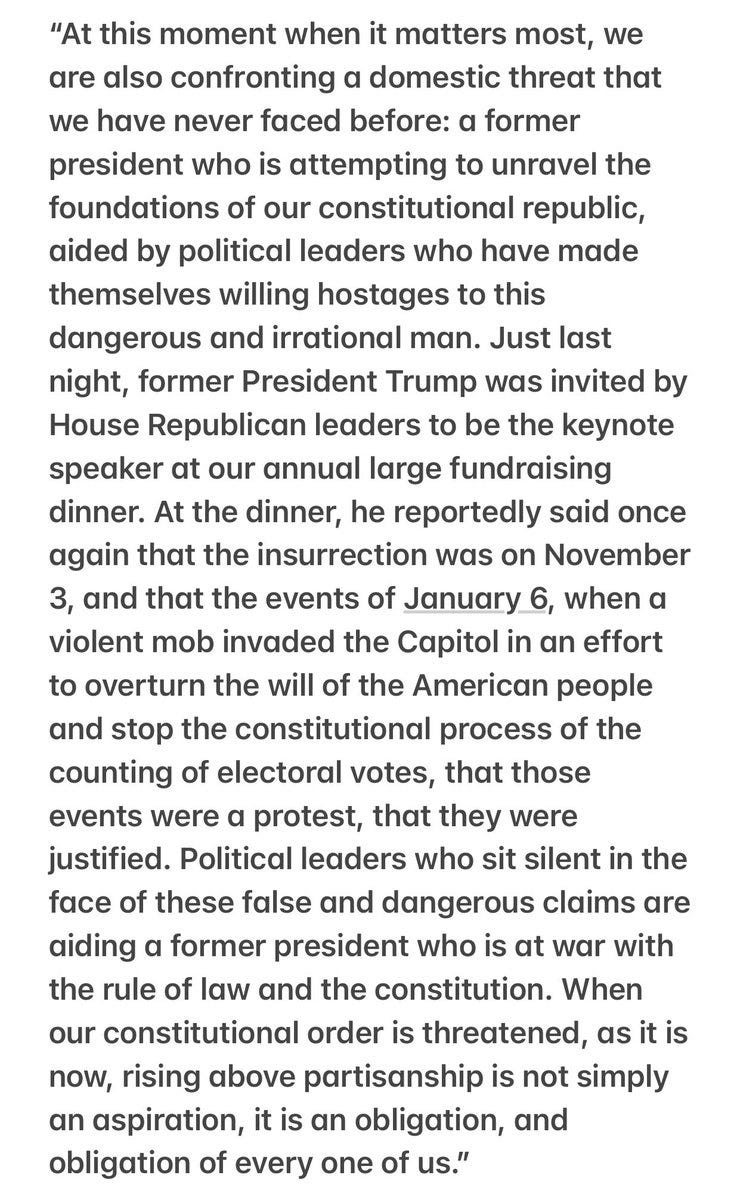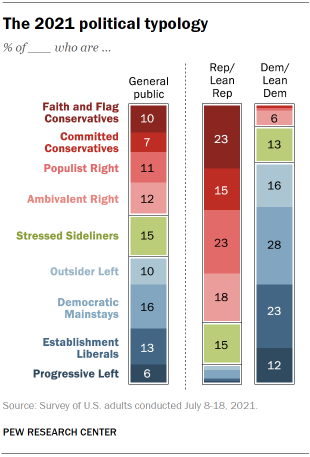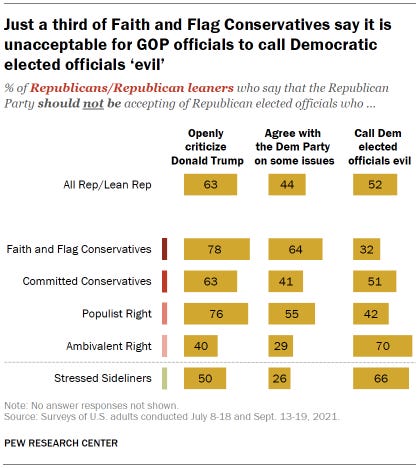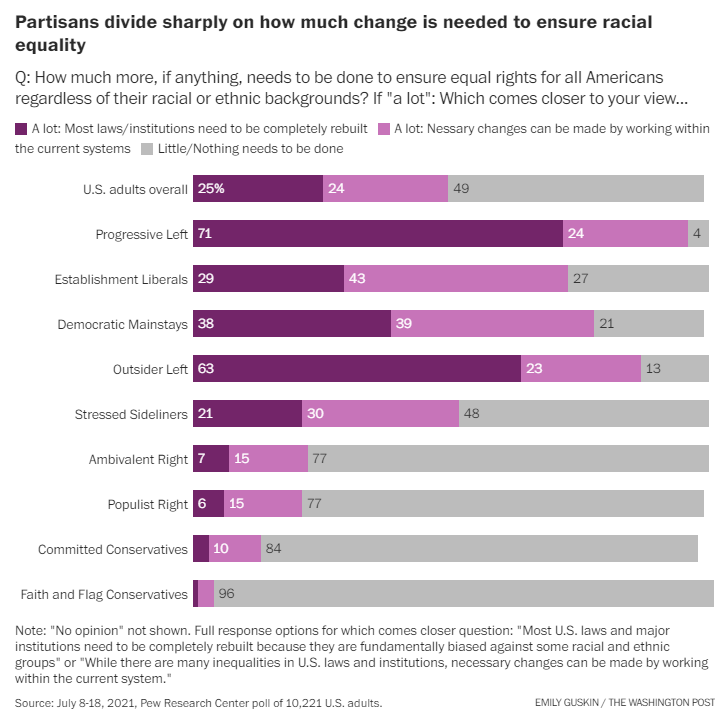Quotes of the day:
Mr. Trump “does not acknowledge the deference owed to the incumbent president’s judgment. His position that he may override the express will of the executive branch appears to be premised on the notion that his executive power ‘exists in perpetuity,’” Judge Chutkan wrote.
“But presidents are not kings, and plaintiff is not president.”
(You can read Kim Wehle’s analysis of the judge’s ruling here.)
**
Liz Cheney:
You can watch the whole thing here:

The 9 Tribes
Ok, not exactly “tribes.” — more like “types.”
The Pew Research Center is out with its new political typology, the eighth edition since 1987, which divides the electorate into nine distinct political groups. Not surprisingly, the study finds deep partisan polarization, but notes that “the gulf that separates Republicans and Democrats sometimes obscures the divisions and diversity of views that exist within both partisan coalitions – and the fact that many Americans do not fit easily into either one.”
Here’s how we break down politically:
One quick takeaway: Note that the hard core Trumpian right makes up only about 28 percent of the electorate — while the progressive left makes up an even smaller share. It seems worth noting that the “Progressive Left and “Outsider Left” make up just 28 percent of the Democrats/Lean Dems.
The largest group in the Democratic coalition are the “Democratic Mainstays,” who are “considerably more likely than other groups to call themselves politically moderate. Still, they hold nearly as liberal positions as other Democratic-oriented groups on economic issues, while they diverge from others in the coalition somewhat on immigration issues…. They also are more invested in U.S. military power than other Democratic-oriented groups. Black Democrats are particularly concentrated in this group: 40% of Black Democrats are Democratic Mainstays.”
**
So where you think you fit in? You can take the quiz here. Here’s my result:
**
This is how Pew broke down folks on the right.
Faith and Flag Conservatives are intensely conservative in all realms; they are far more likely than all other typology groups to say government policies should support religious values and that compromise in politics is just “selling out on what you believe in.”
Committed Conservatives also express conservative views across the board, but with a somewhat softer edge, particularly on issues of immigration and America’s place in the world.
Populist Right, who have less formal education than most other typology groups and are among the most likely to live in rural areas, are highly critical of both immigrants and major U.S. corporations.
Ambivalent Right, the youngest and least conservative GOP-aligned group, hold conservative views about the size of government, the economic system and issues of race and gender. But they are the only group on the political right in which majorities favor legal abortion and say marijuana should be legal for recreational and medical use. They are also distinct in their views about Donald Trump – while a majority voted for him in 2020, most say they would prefer he not continue to be a major political figure.
[Almost all Faith and Flag Conservatives (99%), Committed Conservatives (96%) and Populist Right (97%) who voted in the 2020 presidential election cast their ballots for Donald Trump, as did a narrower majority (70%) of Ambivalent Right voters.]
The only typology group without a clear partisan orientation – Stressed Sideliners – also is the group with the lowest level of political engagement. Stressed Sideliners, who make up 15% of the public but constituted just 10% of voters in 2020, have a mix of conservative and liberal views but are largely defined by their minimal interest in politics.
[49% voted for Trump.]
Among the other findings: conservatives have been heavily Trumpified… but not uniformly so. “A majority of Republicans and Republican leaners (63%) say that the Republican Party should not be accepting of elected officials who are openly critical of Trump, including 78% of Faith and Flag Conservatives, 76% of Populist Right and 63% of Committed Conservatives.” But this suggests that at least 37 percent of Republicans remain open to criticism of Trump.
This is especially true of the squishy right: “Ambivalent Right and Stressed Sideliner Republicans are more open to officials who criticize Trump: A majority of Republicans and Republican leaners who are Ambivalent Right (58%) say the party should be somewhat or very accepting of those who criticize Trump, and 49% of Republicans and Republican leaners who are Stressed Sideliners say this.”
But there is still a considerable appetite for/tolerance of over-heated rhetoric:
**
Perhaps the biggest divide in American politics is the question of racial justice. This illustration is via the Wapo:
Subpoenas, subpoenas, subpoenas…
The January 6 Committee is out with 10 new subpoenas, targeting Trump’s inner-inner circle. The new list includes, Keith Kellogg, Mr. Pence’s national security adviser, and Kayleigh McEnany, the former White House press secretary, along with homunculus Stephen Miller. Others on the list: Nicholas Luna, Trump’s “body man”, Ben Williamson, an adviser to the former White House chief of staff Mark Meadows, and Molly Michael, a White House assistant.
As the NYT notes: “In the past two days alone, the panel has nearly doubled the number of subpoenas it has issued, bringing the total to 35.”
The committee also subpoenaed Johnny McEntee, “a former White House personnel director, who was reportedly in the Oval Office during a meeting with Mr. Trump and Mr. Pence when Rudolph W. Giuliani, the former president’s personal lawyer, suggested seizing Dominion voting machines because of election fraud.
Who is Johnny McEntee?
Today’s must-read is an excerpt from Jonathan Karl’s new book: “The Man Who Made January 6 Possible: The story of Johnny McEntee—the “deputy president” who rose to power at precisely the moment when democracy was falling apart.”
The office was run by Johnny McEntee. Just 29 when he got the job, he’d come up as Trump’s body guy—the kid who carried the candidate’s bags. One of Trump’s most high-profile Cabinet secretaries described him to me as “a fucking idiot.” But in 2020, his power was undeniable. Trump knew he was the one person willing to do anything Trump wanted. As another senior official told me, “He became the deputy president.”
McEntee and his enforcers made the disastrous last weeks of the Trump presidency possible. They backed the president’s manic drive to overturn the election, and helped set the stage for the January 6 assault on the Capitol. Thanks to them, in the end, the elusive “adults in the room”—those who might have been willing to confront the president or try to control his most destructive tendencies—were silenced or gone. But McEntee was there—bossing around Cabinet secretaries, decapitating the civilian leadership at the Pentagon, and forcing officials high and low to state their allegiance to Trump.
Who wants to be a senator? Not Chris Sununu
Think about what this says about the US Senate these days. Given the Senate's dysfunctional politics, who wouldn't rather be a governor, where you get to do your own thing, and not be Mitch McConnell's sock puppet?
At a news conference in Concord, N.H., Sununu, 47, said he appreciated those who had reached out but ultimately decided that he could be more “impactful” by staying in his current job rather than going to Washington.
“I like getting stuff done,” Sununu said. “I don’t think they could handle me down there. I’d be like a lion in a cage.”
Sununu said that there was “definitely a period where I was leaning toward running” for the Senate but that he concluded after consulting with others that being a senator “doesn’t fit my style.” He portrayed the Senate as a slow-moving institution rife with partisan politics.
How we live now.
Via the Wapo: “Death threats, online abuse, police protection: School board members face dark new reality.”
The ongoing harassment of school board members runs the gamut: In Illinois, a man was arrested for striking a school official at a September board meeting. In Hilton, N.Y., three people were arrested at a school board meeting last month — one for refusing to put on a mask, two for refusing to leave after the school board president suspended the meeting because of attendees’ unruly behavior.
And in Pennsylvania, a Republican candidate for Northampton County executive said at an August rally that he would bring “20 strong men” to the next school board meeting so they could “replace [board members] with nine parents and we’re going to vote down the mask mandates . . . this is how you get stuff done.” Steve Lynch, who was in D.C. at the time of the Jan. 6 Capitol insurrection, denied he meant to threaten board members. He ultimately lost his election.
Quick Hits
Welcome to the Daddy Wars
Mona Charen, in today’s Bulwark:
But here is the bigger problem with the conservative critique on masculinity and family issues: Hawley and Cotton and Carlson and Boebert and their crew all pay lip service to family values while lashing themselves to the Greatest Toxic Male in American history. They have embraced the vilest form of masculinity—strutting, bullying, disrespectful, selfish, vain, childish, and reckless, not to mention philandering and sexually assaulting.
Theirs is the party of Hershel Walker, Eric Greitens, Sean Parnell, and Max Miller, all of whom, as The Bulwark’s Amanda Carpenter has documented, have or are alleged to have engaged in various degrees of assault against the women in their lives. They are members of the GOP in good standing, while Liz Cheney and Mitt Romney are pariahs. And Hawley and Co. mock Buttigieg? He’s doing the hands-on work of fatherhood. If more American men were deeply involved in raising their children, many of the problems that worry social conservatives would be drastically reduced.
These avatars of manliness are confirming the worst suspicions of feminists, and moving us further from the goal that both sides should embrace—repairing marriage, decency, and family stability.
Cheap Shots
And he thinks that humans and dinosaurs lived at the same time… which seems consistent.

Courage.













I heard Shannon Freshour's take on AG Merrick Garland's failure, thus far, to act on the criminal referral regarding Steve Bannon's snub of the 1/6 Committee's subpoena. For the record, we're at about Day 17 with no action. For those who missed Freshour's take, her position is that it takes a long time to develop a federal criminal case and that Garland is doing his job by making sure that all the I's are dotted and T's are crossed before deciding whether to proceed. She cited her experience in a support role in litigating cases, and noted how long it takes to get a case ready.
I've been an attorney since 1987 so let me tell you why she is wrong on this case. She is right that most federal criminal prosecutions require extensive time to develop the facts. But this is an issue of enforcing a subpoena - the facts are already developed and are straightforward. There is no factual record to develop. The only issue is the application of the law to the failure to comply with the subpoena. Research of the case law and statutes regarding federal subpoena enforcement and executive privilege wouldn't take more than a few hours at best.
There is no justification for Garland's delay. None. But it brings me back to my constant emphasis that Congress needs to use its inherent contempt power to enforce its own subpoenas.
Democratic Mainstay here, but I would vociferously argue that the questions aren't nearly nuanced enough to capture someone's true principles.
I will also continue to affirm (to anybody that will listen) that far too many voters are just too damn ignorant to be considered "informed".